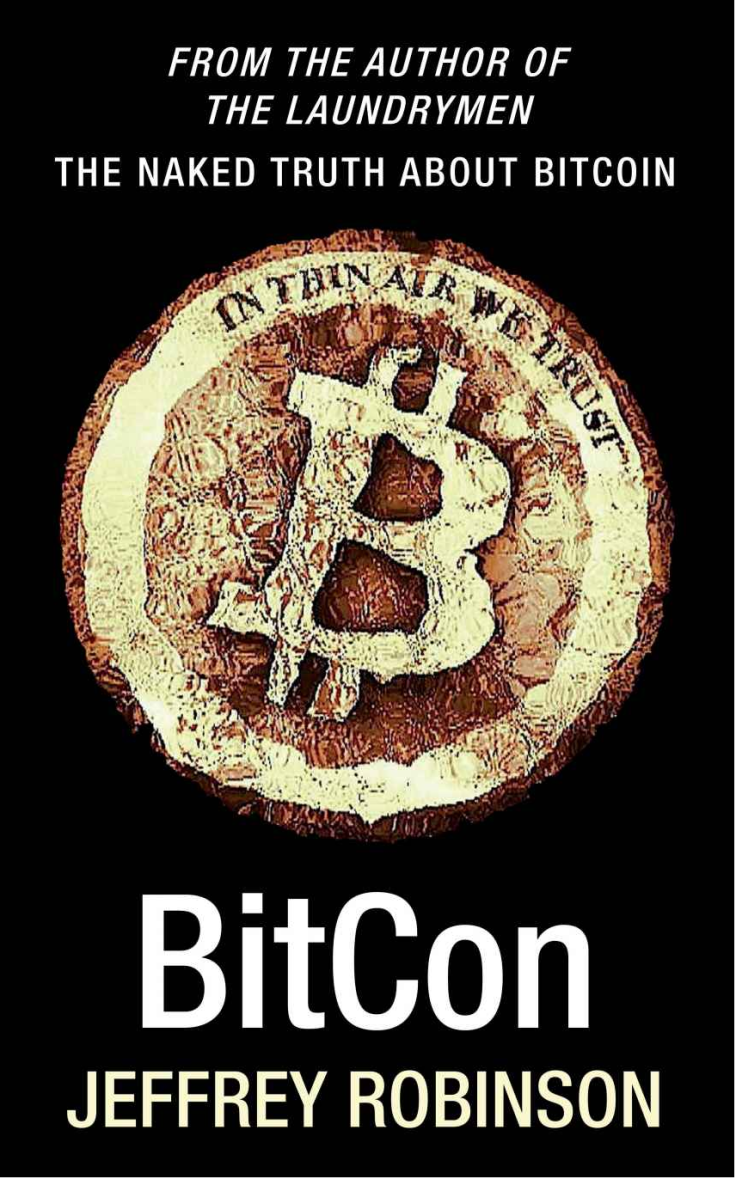BitCon: The Naked Truth About Bitcoin - Jeffrey Robinson's Teardown of World's Biggest Cryptocurrency

Jeffrey Robinson has written extensively about financial crime. His 1995 book on money laundering, The Laundrymen, was a best seller; in other books he has flagged up the sort of financial risk-taking that led to the financial crash more than a decade before it happened.
It's a pedigree that steers his focus toward the alleged scheming, manipulation and criminal intent that have been attached to bitcoin during its short, turbulent history.
Near the beginning of his exposition, Robinson admits the blockchain technology behind bitcoin "happens to be brilliant". Apparently he has a soft spot for Satoshi Nakamoto (he lays into Newsweek at some length for its "shoddy" attempt to reveal the bitcoin founder's identity). But the main thread of his book is a sustained stream of argument and invective directed at what he calls the bitcoin "Faithful".
Messianic fervour
These are people who are as pro-bitcoin as they are anti-establishment; they don't understand the laws behind currencies or commodities, or are so blinded by messianic fervour that they now ignore rational argument. And there are those who have a vested interest in seeing bitcoin inflate. These types are not mutually exclusive, quite the opposite.

Robinson also sets out a rogue's gallery of bitcoin miscreants, the star players of which are Ross Ulbricht, the alleged operator of Silk Road and Mt Gox's Mark Karpeles (right), set against a backdrop of the dreaded dark web and the murky world of anonymous mining cartels.
The Winklevoss twins could also be added to this unpleasant subset. "There is a rule. If the Winklevoss twins are talking about it, it's got to be opportunistic," notes one academic speaking to the author.
Neither currency nor commodity
In the first few chapters Robinson sets out to establish that bitcoin is neither a currency nor a commodity. All the bitcoins there could possibly be, trading in the best of all possible worlds at $1000-plus, would still comprise an infinitesimal fraction of the dollars in circulation.
On top of this he adds that people who own bitcoins tend to hoard them rather than actually using them for transactions – how are they ever going to usurp corrupt governments and make central bakers obsolete when nobody actually uses them, Robinson asks.
As the number of merchants tripled during the course of 2013-2014, the number of transactions stayed the same, meaning the bitcoin economy is stagnant.
Commodities, he argues, have an underlying function – coal, copper, wheat etc - but bitcoin is a useless nothingness with zero intrinsic value. Former Fed leader Alan Greenspan is invoked in this regard: "You have to really stretch your imagination to infer what the intrinsic value of biotcoin is. I haven't been able to do it."
"Naturally occurring Ponzi scheme"
Robinson feels bitcoin bears way too much of a resemblance to a Ponzi scheme not to mention it. Even if it lacks the essential feature of a middle man, siphoning off value, the likeness is uncanny he says. In the end he settles for dubbing it a "naturally occurring Ponzi scheme". Like the tulip craze that seized Holland in the 1630s, bitcoin is a berserk speculative bubble – the analogy is Warren Buffett's.
In addition to the seismic events in bitcoin's existence – Silk Road being closed, Mt Gox's collapse, bitcoin value breaking $1000 – Robinson examines a wide range of quotidian occurrences; stuff that was big, big news at the time.
Indeed another of his pet hates is bitcoin media hype.
He seems to have been pulling his hair out over reports that bitcoin is taking off in India (45 attendees at a conference out of a country of one billion people); or a pizzeria in Dubai that accepts bitcoin described as "another milestone". In January 2014 the Wall Street Journal reported that half of techies would welcome being paid in bitcoin. After a bit of digging Robinson reveals that out of 18,000 techies canvassed only 847 actually responded, so that really adds up to 2.4%.
Character assassination
However, there are moments when he verges into personal attacks and rather dwells on salacious detail.
For instance, his character assassination of Mark Karpeles points out that had no friends, liked to stay in his room and read comics, referred to his "jpeg girlfriends", and put pictures of his cat on Facebook. What has this got to do with price of bitcoins?
We begin to see that Robinson's vehement distrust of libertarians espousing a bitcoin-led revolt, makes him sound a bit like Edmund Burke warning about the dangers of revolution.
Robinson's aim is to make a connection between Mt Gox collapsing and the abrupt end of China's bitcoin fever, the latter having driven the price up to $1240, until Beijing cracked down and the price crashed. Around the same time (coincidentally) Mt Gox collapsed; Robinson's terrier-like financial crime super-sense is on high alert.
Robinson also attacks Ulbricht, who is currently awaiting trial for allegedly operating the Silk Road website, but Robinson dispenses with legal caution branding Ulbricht a drug and arms dealer as well as alleging he took contracts out on the lives of anyone who got in his way – paid for in bitcoin naturally.
And after quoting bitcoin evangelist Roger Ver as saying "all value is subjective", Robinson claims the entrepreneur moved to St Kitts to sell passports to tax exiles in turn for real estate investments.
True blue Conservative
We begin to see that Robinson's vehement distrust of libertarians espousing a bitcoin-led revolt, makes him sound a bit like Edmund Burke warning about the dangers of revolution.
Laying down the law like a true blue Conservative, at one point he states: "Intrinsic value of the dollar comes from the full faith and credit of the US government standing behind it, the fact that you must use it to pay your taxes – and the Federal Reserve promises to buy back dollars under certain conditions ... etc, etc."
There have in fact been some interesting experiments involving decentralised cash. Between 1932 and 1933, the small Austrian town of Wörgl issued 5000 "Free Schillings" (i.e. interest-free schillings). These were used in co-operative fashion to built utilities and accepted around a town's community. Within one year the 5000 Free Schillings circulated 463 times; when other communities in Austria wanted to adopt this model, the Austrian National Bank saw its own monopoly was endangered and prevented the experiment continuing, taking the town's council to the Austrian Supreme Court.
It's also worth remembering that today's fiat currencies were also unlikely pretenders at one point. Back when the Bank of England was the only trusted regulator of money "the dollar sucked as a currency", as Robinson's analysis says.
Blockchain's potential
Further back in time, the church used to be as powerful as banks are today; it saw money as inherently evil and unworkable because of its tendency to generate interest (usury). That money is the root of all evils is an idea that persists within revealed religions, and usury is still banned for Muslims. Robinson does touch on this fact: bitcoin could show potential when it comes to funding Islamic terror groups thanks to its compliance with sharia law, he muses.
The point concerns the very long view which must be taken regarding technologies, and also how these make users of them evolve and change. There is a long term ethical argument which falls outside the scope of Robinson's criminal investigations.
The last few chapters include an interesting discussion of competing electronic money options and e-wallet innovation players, followed by the setting of bitcoin licences for the state of New York, overseen by the formidable Benjamin Lawsky.
Regarding blockchain – which the "Faithful" would rather see destroyed than separated from bitcoin - he echoes Marc Andresen, who states he is not a utopian on this topic, but is interested only in "practical capabilities that matter to real people".
These could include things like enforceable contracts, logging and updating all manner of records, signatures, medical files and so on. Hoards of venture capitalists are looking at the technology to create new businesses taking advantage of platforms that eliminate transactional risk.
West Coast pseudo-libertarians
It's clear that Robinson's gripe is with bitcoin in particular and its West Coast pseudo-libertarian roots. He mentions Ripple towards the end of the book, but largely ignores the growing universe of altcoins with putative dollar values.
But whether he is right about penning bitcoin's obituary, this doesn't change the fact it is a reaction to a deep mistrust in the financial system and the governments that were called to prop that system up in 2008.
And the same way that technology like social media helped overthrow governing regimes in the Arab world, so technologically-enabled revolt in the developed world, currently in the form of bitcoin, will persist one way or another. It is a leap of faith argument; but then we are living through a technological revolution.
It seems unlikely the co-operative of developers, miners and enthusiasts behind bitcoin will give up that dream, or at least allow it to be scammed and manipulated into the world of vice and crime envisaged by Robinson.
© Copyright IBTimes 2025. All rights reserved.






















